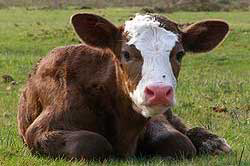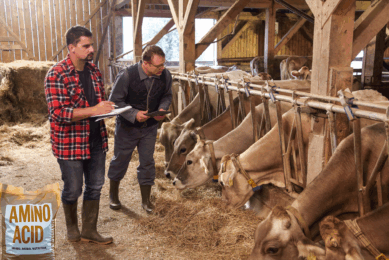Amino acids for healthier calves?

New Mexico State University Assistant Professor Eric Scholljegerdes is developing an amino acid feed supplement and studying the influence it has on fetal programming. The big question: can amino acids help breeding cows during drought and does it help give calves a more efficient digestive system?
Pregnant cows have a harder time during drought because they are eating for two. If they are not able to consume and digest the required nutrients during pregnancy, calf development can be negatively influenced, which in turn has an impact on the dollars in the cattle producer’s bank account.
To help the cows’ digestive systems to be more efficient in harvesting nutrients from poor-quality forage, New Mexico State University Assistant Professor Eric Scholljegerdes is developing an amino acid feed supplement and studying the influence it has on foetal programming.
Increase in blood flow
“This particular amino acid has been shown to stimulate blood flow by increasing the number and size of blood vessels going to the placenta,” said Scholljegerdes, beef cattle nutritionist. He is conducting research on cattle at NMSU’s Corona Range and Livestock Research Center. “This increase in blood flow should stimulate the overall nutrients supplied to the foetus. By giving the amino acid supplement to the cow 40 days into gestation when foetal organs are developing, in particular the digestive tract and associated organs, it should help the digestive system function better after birth.” The first generation of calves, born during the fall of 2013, is currently being monitored to assess the impact of this feeding programme.
Birth weight
“One of the first questions we hoped to answer is how it was going to influence the birth weight. The answer is that the offspring of the amino acid supplemented cows did not have higher birth weights, and that is important to cattle producers,” he said. “We are now conducting performance tests on the calves to determine if their digestive system is more efficient than the control group of the mothers who did not receive the amino acid.”
A second part of the study is looking at the impact of the amino acid feed supplement administered 200 days into gestation, during the last trimester of the pregnancy.
Tolerate poor forage
“Overall, we hope that we can improve females’ longevity by enhancing the digestive system,” Scholljegerdes said. “So when the cow is pregnant and we are in a drought, we are hopeful that through this feeding programme she will be able to tolerate poor forage and extract the nutrients she needs for her developing foetus.”
The downside to this work, he said, is that during the early period of gestation when this programme may have the greatest impact, grass is starting to grow and is typically of high quality. Many cattle producers do not want to supplement cows because quality of the grass is sufficient to meet their needs. “I don’t disagree with that at all, but if we can come up with a 30-day nutrient supplement programme that’s going to stimulate the calf’s future abilities to thrive, then I would argue the ends may justify the means,” Scholljegerdes said.
Source: Drovers Cattle Network











